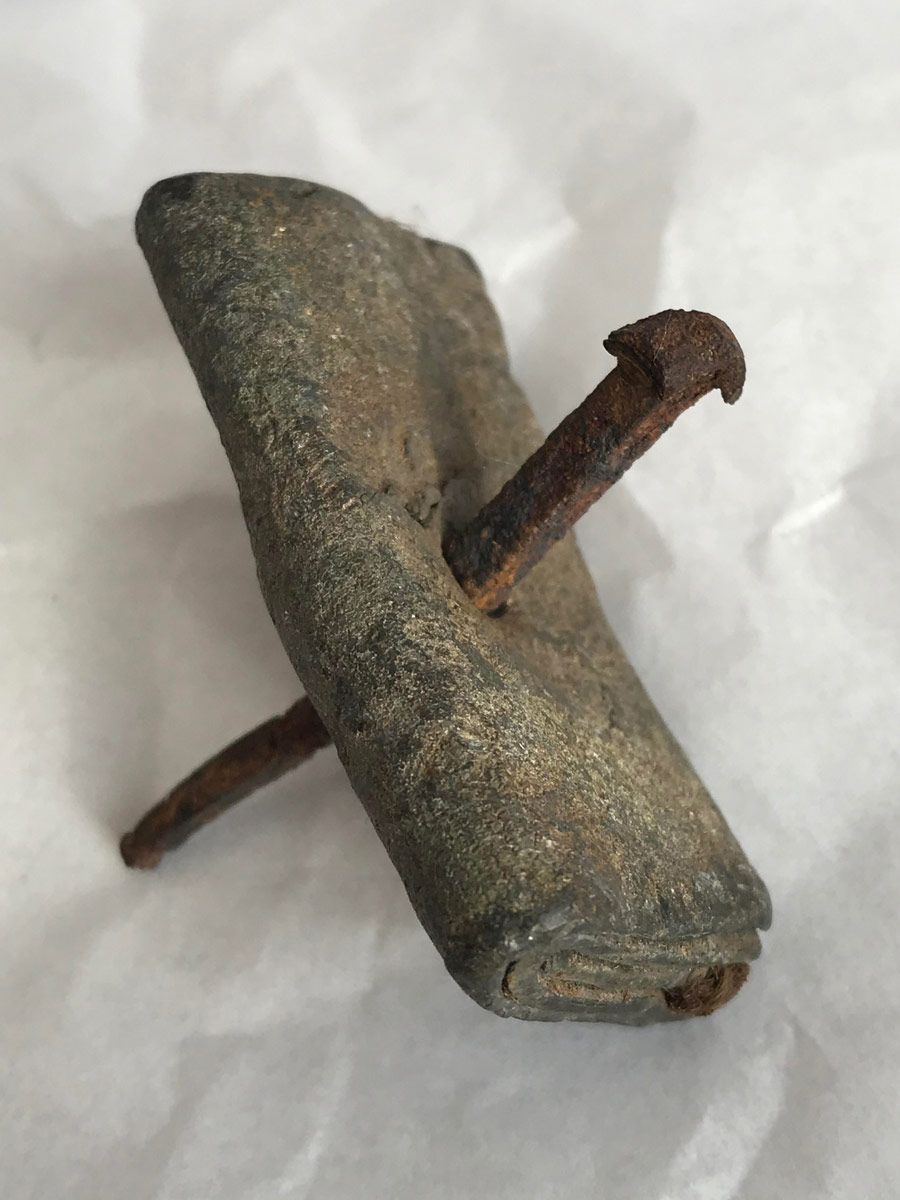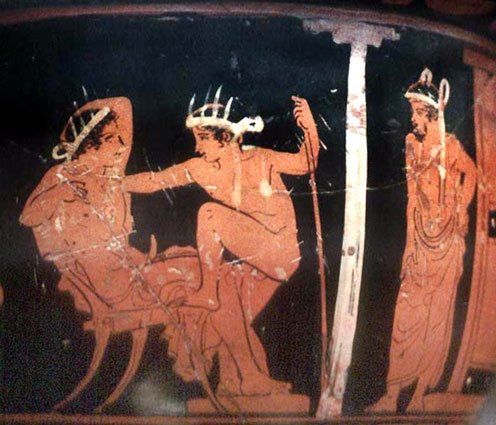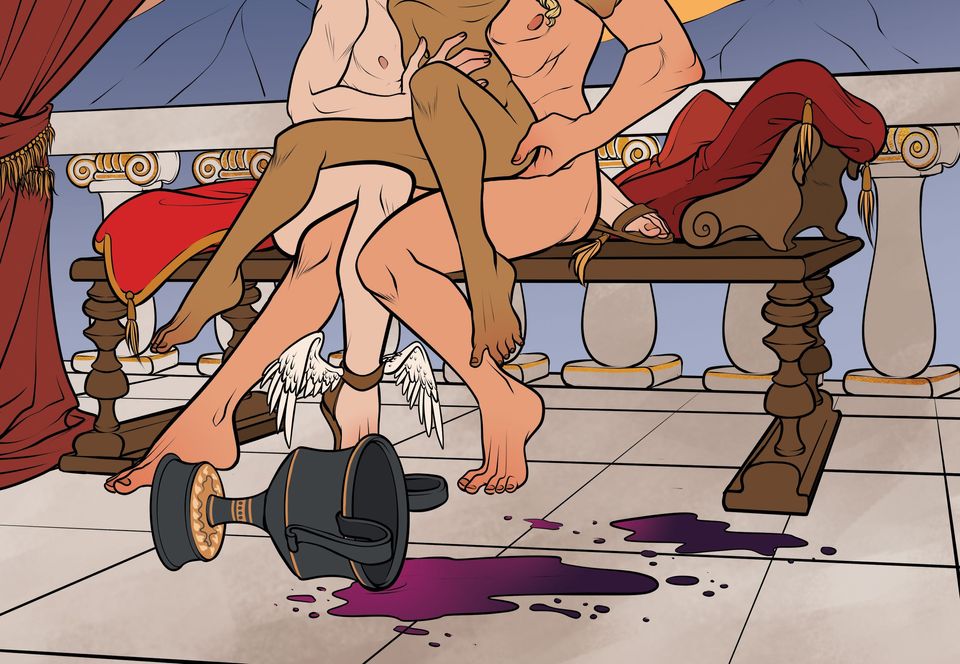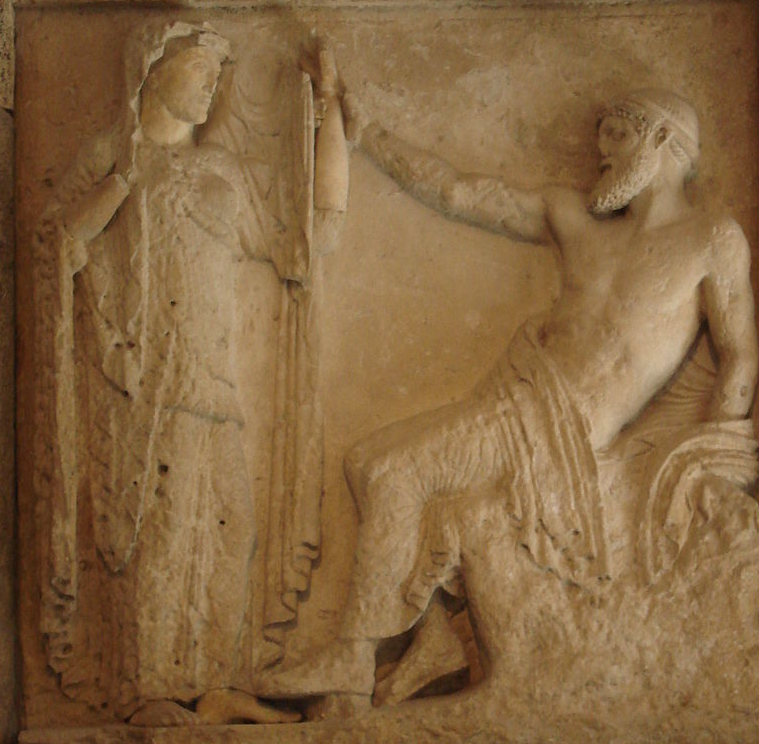Ancient Erotica: Sexual Curse Tablets

The first time I ever heard about curse tablets was when I visited Bath and its namesake Roman bath. The curse tablets found there were written in Latin and addressed to local goddess Sulis, identified by the Romans with Minerva.
A curse tablet, called tabella defixionis or defixio in Latin and katadesmos in ancient Greek is a small tablet, often made of lead, stone or baked clay, asking a god, spirit or dead person for help. The tablet was then secretly buried or hidden in a significant place.
Curse tablets were a popular type of magic throughout the Greco-Roman world used by both, men and women. And of course people back then cared just as much about sex and love as they do today. The ones in Bath dealt with the return of stolen possessions, with the exception of one:
"Qui mihi Vilbiam involavit sic liquat comodo aqua. Ell[…] muta qui eam involavit si Velvinna, Exsupereus, Verianus, Severinus, Augustalis, Comitianus, Catus, Minianus, Germanilla, Iovina."
"May he who carried off Vilbia from me become liquid as the water. May she who so obscenely devoured her become dumb, whether Velvinna, Exsupereus, Verianus, Severinus, Augustalis, Comitianus, Catus, Minianus, Germanilla (or) Jovina."
Bath / Aquae Sulis, England, 43-410 CE
This curse tablet also deals with a theft, but it's the theft of a girl named Vilbia. Whether Vilbia was actually the writer's slave, or only his concubine, either would make sense here.
A Love Affair with Eterna
The only surviving curse from Britain with a truly erotic context was found in Old Harlow, Essex:
"Mio M(ercurio) dono ti(bi) negotium Et-ern(a)e et ipsam, nec sit i(n)vidi(a) me(i) Timotneo sangui(n)e suo."
"To the god Mercury, I entrust to you my affair with Eterna and her own self, and may Timotneus feel no jealousy of me at the risk of his life-blood."
Old Harlow, England, found together with 3rd-4th century pottery
Mercury or Hermes is the god of thieves, magic and spells (among many other things) and as the guide of dead souls he moves freely between the world and the underworld. Hermes, Charon, Hekate, and Persephone were most often addressed to bring about a curse tablet's spell.
In comparison, this excerpt from a curse found inside a wax figurine in Upper Egypt, is far more dramatic:
"[...] Rouse yourselves, you daimones who lie here and seek out Euphêmia, to whom Dôrothea gave birth, for Thêon, to whom Proechia gave birth. Let her not be able to sleep for the entire night, but lead her until she comes to his feet, loving him with a frenzied love, with affection and with sexual intercourse. For I have bound her brain and hands and viscera and genitals and heart for the love of me, Thêon..."
5th century CE, Upper Egypt
The following, similar spell is also from Egypt. It was inscribed in Greek on a lead tablet that was rolled up around some strands of brownish red hair and inserted into the mouth of a mummy, to whom the spell was apparently addressed:
"Aye, lord demon, attract, inflame, destroy, burn, cause her to swoon from love as she is being burnt, inflamed. Goad the tortured soul, the heart of Karosa...until she leaps forth and comes to Apalos...out of passion and love, in this very hour, immediately, immediately; quickly, quickly...do not allow Karosa herself...to think of her [own] husband, her child, drink, food, but let her come melting for passion and love and intercourse, especially yearning for the intercourse of Apalos."
Eshmunen, Egypt
Another spell of the same kind, but from a woman this time:
"Ad(iur)o … per magnum deum et per (An)terotas … et per eum, qui habet archep-torem (= accipitrem) supra caput et per septem stellas, ut, ex qua hora (h)oc somposuero (= composuero), non dormiat Sextilios, Dionysi(a)e filius, uratur furens, non dormiat neque sedeat neque loquatur, sed in mentem (h)abiat me Septimam, Amene (= Amoenae) filia(m); uratur furens amore et desiderio meo, anima et cor uratur Sextili, Dionysi(a)e filius (= filii), amore et desiderio meo.
Septimes, Am(o)en(a)e fili(a)e. Tu autem Abar Barbarie Eloee Sabaoth Pachnouphy Pythipemi, fac Sextilium, Dionysi(a)e filium, ne somnum contingat, set amore et desi derio meo uratur, (h)uius spiritus et cor comburatur, omnia membra totius corporis Sextili, Dionysi(a)e filius (filii). Si minus, descendo in adytus Osyris et dissolvam τὴν ταφήν et mittam ut a flumine feratur; ego enim sum magnus decanus dei magni, dei AXRAMMACHALALA.E."
"I forswear you, the great god [i.e. Osiris], and Anterotes [Anteros, god of requited love] and the one with a hawk head [i.e. Horus, the Egyptian god of death], and the seven stars [i.e. planets], from the moment I put this tablet [into the grave], may Sextilius, son of Dionysia, not sleep, may he burn [with passion] in madness, may he not sleep, nor sit, nor speak, but bear in his mind me, Septima, daughter of Amoena; may he burn with love and longing for me, may the mind and heart of Sextilius, son of Dionysia, burn with love and longing for me, Septima, daughter of Amoena. And you, Abar, Barbarie, Eloe, Sabaoth, Pachnouphy, and Pythipemi, make Sextilius, son of Dionysia, unable to sleep, but burn with love and longing for me, may his spirit and heart, as well as all limbs of Sextilius’ body be consumed by love: if not, I will descend into the shrine [grave] of Osiris, open his grave and throw him [into the river], so that he is carried away by the current; because I am the great decan of the god, mighty god AXRAMMAXALALA.E."
Sousse / Hadrumetum, Tunisia, 2nd century CE
Separation Curses
Many curses written for erotic motives aimed to drive a person desired away from their current lover, husband or wife and to direct their love towards the commissioner of the tablet:
"Of [Theti]ma and Dionysophon the ritual wedding and the marriage I bind by a written spell, and of all other wo[men], both widows and maidens, but of Thetima in particular, and I entrust to Makron and [the] daimones, and (only) when I should dig up again and unroll and read this, [?] that she might wed Dionysophon, but not before, for I wish him to take no other woman than me, and that [I] grow old with Dionysophon, and no one else. I [am] your supplicant:
Have pity on Phila, dear daimones, for I am (a) dagina? of all my dear ones and I am abandoned. But guard [this] for my sake so that these things do not happen, and wretched Thetima perishes miserably. [...] but that I become happy and blessed."
Pella, Macedonia, 375–350 BCE
"Makron" is most probably the name of the dead man in whose grave the tablet was deposited to deliver the message to the chthonic spirits of the underworld (the daimones).
Of course, those curses also targeted same-sex lovers:
"I turn away Euboles from Aineas, from his face, from his eyes, from his mouth, from his breasts, from his soul, from his belly, from his penis, from his anus, from his entire body. I turn away Euboles from Aineas."
Nemea, Greece, 4th century BCE
Everlasting Sex
Cursing rivals with impotence and sexual misery and to attract a lover were also common motives. The culmination of the process was often envisaged as everlasting sex:
"I bind you, Theodotis, daughter of Eus, by the tail of the snake, the mouth of the crocodile, the horns of the ram, the poison of the asp, the hairs of the cat, and the penis of the god so that you may never be able to sleep with any other man, nor be screwed, nor be taken anally, nor fellate, nor find pleasure with any other man but me, Ammonion, son of Hermitaris. For I alone am LAMPSOURE’ OTHIKALAK’ AIPHNOSABAO’ STESEON’ UELLAPHONTA’ SANKIST’ CHPHURIS’ ON. Make us of this binding spell, employed by Isis, so that Theodotis, daughter of Eus, may no longer try anything with any other man but me alone, Ammonion, and may be subservient, obedient, eager, flying through the air seeking after Ammonion, son of Hermitaris and bring her thigh close to his, her genitals close to his, in unending intercourse for all the time of her life. And here are the figures:"
[Features some images of a god holding a staff, with a snake at his feet, a crocodile to the upper right of the snake, a cat at the extreme right, two figures (perhaps a ram and the woman) above the crocodile, and other magical signs and letters and obscure drawings.]
Egypt, 2nd-3rd century CE
I bind Theodora to remain unmarried to Charias, and I bind Charias to forget Theodora,and I bind Charias to forget . . . Theodora and sex with Theodora. And just as this corpse lies useless, so may all the words and deeds of Theodora be useless with regard to Charias and to the other people. I bind Theodora before Hermes of the underworld and before the unmarried and before Tethys. I bind everything, both her words and deeds toward Charias and toward other people, and her sex with Charias.
4th century BCE
The person performing the spell, presumably a woman who wants Charias for herself, wishes that Theodora be as incapable of having a sexual relation with Charias as the corpse into whose grave the tablet has been deposited. Graves and tombs were considered a gateway by means of which the curse would reach the dead or underworld deities charged with its execution.
Calling on Aphrodite
A curse intended to affect a person's sexuality oftentimes called upon those chthonic gods alongside a sexual deity—Aphrodite and Eros were quite common, as was the goddess Isis from the Egyptian pantheon.
An example of a sexual curse comes from a man named Pausanias (no, not the ancient historian) who wanted to bind a woman called Sime:
"Pausanias binds Sime, daughter of Amphitritus (may no one but Pausanias undo this spell) until she does for Pausanias everything Pausanias wants. May she not be able to get hold of a sacrificial victim of Athena, nor may Aphrodite look kindly upon her, before Sime embraces Pausanias."
Akanthos, Macedonia, 4th or 3rd century BCE
The Penis Curse Tablet
This curse tablet from Cyprus’s old city kingdom of Amathus went straight to the point:
“May your penis hurt when you make love.”
Amathus, Cyprus, 7th century CE
Pierre Aubert, head of Athens Archaeological School in Greece said the tablet showed a man standing holding something in his right hand that looks like an hour glass. Perhaps most surprising is the young age of this tablet: The inscription dates back to the 7th century CE when Christianity was already well established on Cyprus. While many of the old pagan beliefs had disappeared or been suppressed by this period, it is clear that people’s love of — and need for — sex-curses had not gone anywhere.
Today, we may not write our curses on lead tablets anymore, and few will ask Hermes or Hekate for help. But the secret wishes to separate a desired partner from their spouse, attract a lover or rain impotence and disaster on a romantic rival are as alive as they were 3000 years ago.
Author's Note: If dates or places are missing beneath the curses, I was unable to track this information down. Despite this shortcoming, I hope to have given an enjoyable overview of the colourful curse tablets of ancient Greece and Rome.
Sources
Curse Tablet Entry on Wikipedia
Getting even in Roman Britain: The Curse Tablets from Bath (Aquae Sulis) by Carly Silver
Ancient Roman Curse Tablets Invoke Goddess Sulis Minerva to Kill and Maim
Curse Tablets from Roman Britain — Introduction: cicrus and court, sex and stealing
Curse Tablets from Roman Britain — Images of curse tablets
Roman Inscriptions of Britain — RIB 154 Curse
Roman Britain Britannia IV 1973
Supplemental Material — Georgetown University
For All Time: An Examination of Romantic Love Through Curse Tablets by Alicia Deadrick
Bewitched, Bothered, and Bewildered — Erotic Magic in the Greco-Roman World by Radcliffe G. Edmonds
Archaeology Magazine: When Spells Worked Magic by Christopher A. Farone
Oracles, Curses, and Risk Among the Ancient Greeks by Esther Eidinow
Latin Curse Texts: Mediterranean Tradition and Local Diversity by Daniela Urbanová
Atlas Obscura presents six sites with a sexual history
Mentalfloss: 7 Ancient Roman Curses You Can Work into Modern Life
Further Reading:
Curse Tablets and Binding Spells from the Ancient World by John Gager
Ancient Greek Love Magic by Christopher A. Faraone
Roman Religion by Valerie M. Warrior
Oracles, Curses, and Risk Among the Ancient Greeks by Esther Eidinow
None of these are affiliate links and I'm not making any money off any purchases. I updated all book links to bookshop.org, a benefit corporation supporting local, independent bookshops.



